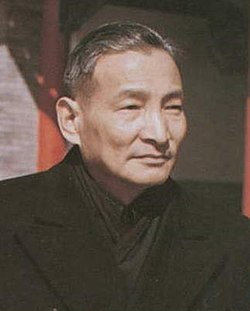Chen Xuechang: Difference between revisions
old>Xiaodong No edit summary |
m (1 revision imported) |
(No difference)
| |
Revision as of 16:57, 11 March 2019
Chén Xuéchāng | |
|---|---|
| 陳学昌 | |
 Colourised photo of Chen Xuechang in 1956 | |
| 3rd First Minister of Xiaodong | |
| In office 24th August 1951 – 20th March 1957 | |
| President | Shen Jianxiao Tao Guangmei |
| Deputy | Li Dongyuan Shen Jinping |
| Preceded by | Ma Renzhong |
| Succeeded by | Li Zhaozheng |
| Chairman of the Xiaodong Regeneration Society | |
| In office 24th August 1951 – 20th March 1957 | |
| Deputy | Li Dongyuan Shen Jinping |
| Preceded by | Ma Renzhong |
| Succeeded by | Li Zhaozheng |
| Chairman of the State Presidium Acting | |
| In office 14rd August 1946 – 25th September 1946 | |
| Prime Minister | Ma Renzhong |
| Preceded by | Yu Changshao |
| Succeeded by | Shen Jianxiao |
| Presiding Officer of the State Presidium | |
| In office 10th April 1938 – 24th August 1951 | |
| President | Lu Keqian Yu Changshao Shen Jianxiao |
| Preceded by | Post established |
| Succeeded by | Luo Wenjing |
| Personal details | |
| Born | June 16, 1897 |
| Died | April 7, 1974 (aged 76) |
| Political party | Xiaodong Regeneration Society |
| Spouse | Liu Ran |
| Children | 4 |
| Alma mater | University of Baiqiao |
| Occupation | Politician |
| Military service | |
| Allegiance | File:Flag of Xiaodong (1876-1951).png Xiaodong (1928-1933) |
| Branch/service | File:Flag of Xiaodong (1876-1951).png Xiaodongese Army (1928-1933) |
| Rank | General |
| Battles/wars | Senrian-Xiaodongese War, Xiaodongese Civil War |
- This is a Xiaodongese name; the family name is Chen (陳).
Chen Xuechang (Xiaodongese: 陳学昌, Chén Xuéchāng; June 16th 1897 - April 7th 1974 aged 76) was a Xiaodongese statesman who served as First Minister of Xiaodong from 1952 to 1957. He also served as the inaugural presiding officer of the State Presidium and its the acting Chairman in 1946.
A former officer in the Xiaodongese colonial army, he served in the Senrian-Xiaodongese War being taken in as a Senrian prisoner of war. Being returned to Xiaodong in a prisoner swap after the Treaty of Keisi, Chen was subsequently appointed as the regional military governor of his native Zhongdong Prefecture. As the governor of the Zhongdong prefecture he openly supported the Corrective Revolution and joined Lu Keqian's Army of National Salvation during the Xiaodongese Civil War, where he served as a general. Chen led the invasion of the Ba Republic where he was appointed military governor of the conquered territory. Chen was soon implicated in widespread human rights abuses in the former republic when serving as its governor from 1937-1938.
In 1938 he was appointed as the first Presiding Officer of the State Presidium by Lu Keqian, being seen as one of his close associates. During his tenure as Presiding Officer he was regarded as a "key architect in the emergence of a dominant party state" and the repression of opposition movements.
In 1951 following the death of Ma Renzhong Chen was appointed a consensus leader to succeed him as First Minister. Chen rose to power as a hardliner and was expected to champion such a line as First Minister - however he in office unexpectedly liberalised the political and cultural spheres allowing for more freedom of the press and protest whilst abolishing government cultural censorship. This led to the start of the "Xiaodongese Spring between 1954-1957, a period of gradual liberalisation.
The Xiaodongese spring however alienated conservative movements within the regime and led to an upsurge in nationalist activity, notably in Duljun. In October 1956 after civil rights protests in Henjintao Chen declared that the Xiaodongese spring was over and reimposed restrictions on the press, freedom of assembly and the political sphere - this move however alienated reformists in the regime who made up the core of his support. With little backing from his peers in the Regeneration Society Chen was ousted at a party conference in March 1957 by a compromise candidate, Li Zhaozheng. He was expelled from the Regeneration Society in 1959 and placed under de facto house arrest in 1965. He died whilst still under house arrest in 1974 of heart failure.
Chen's time in government was marked by economic growth and political stability - however his reforms were criticised by hardliners as ceding power to the opposition whilst reformers stated the reforms were to timid and that they were opportunist in nature. Chen's role in suppressing the Ba Republic has earned him notoriety amongst the Ba people where he remains a "totemic figure of hatred".